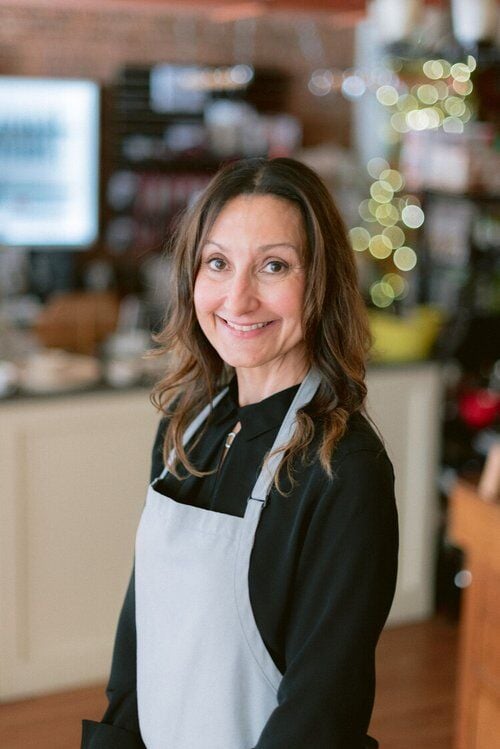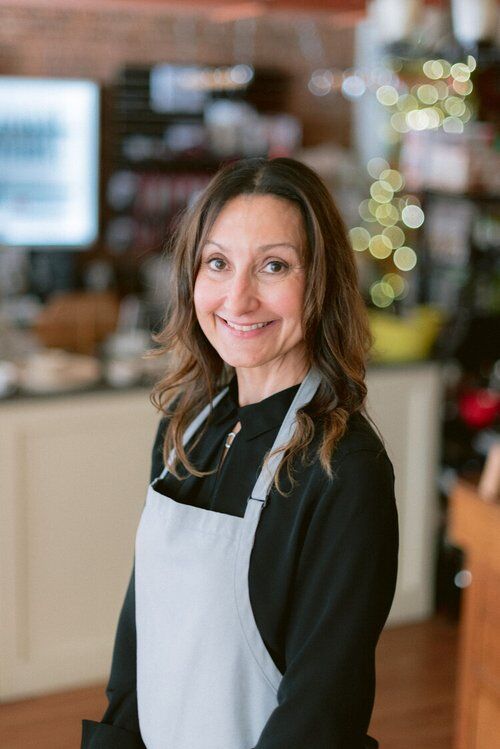“Barefoot and pregnant in the kitchen” is a figure of speech most commonly associated with the old fashioned idea that women should mother many children during their reproductive years and not work outside the home.
In my kitchen shop, I have heard this phrase countless times as customers try on aprons.
After doing some research, I discovered that the phrase “barefoot and pregnant” probably was first used sometime before 1950; however, its usage might date back as early as the 1910s.
An article published in 1958 states the phrase was first used by a “Dr. Hertzler” 40 years earlier.
“Some forty years ago, Dr. Hertzler advanced a hypothesis in which young women of today seem bent on proving correct. ‘The only way to keep a woman happy,’ he said, ‘is to keep her barefoot and pregnant.’”
My gut reaction to this phrase is negative. It immediately conjures images of the 1950s, during which time picture perfect housewives wore waist-cinching aprons and impossibly high heels while cooking and cleaning and taking care of the multiple children while her husband sauntered off to work with her home-made lunch in a box.
Heck, even the women who had jobs were obligated to prepare meals before and after work. For much of history, the kitchen has been considered the women’s domain.
To understand why this is, we have to back up a couple hundred years. Prior to the 19th century, there wasn’t this split between home and public spaces. Most people were farmers, and the home was conveniently the center of work. Husbands and wives were together in the business of producing their income on the farm.
But when a middle class began to emerge in the mid-1800s, more men began to work at jobs that required them to leave the house, and women were left to stay and tend for homes that were no longer the center of production. A theme began to emerge in women’s magazines and books about “the role of the house” and a woman’s place within it.
The link between a woman’s character and her ability to take care of the home really stuck. These roles were hard-wired for so long that men didn’t want to take part in domestic duties because it was known to be “women’s work.” And because women were seen as lesser than men, their work was seen as less important.
Equality in domestic duties is very much a work in progress. Today, women comprise 54% of U.S. workers, but they carry a great load when it comes to household upkeep and child rearing.
On an average day, women spend more than twice as much time preparing meals and housekeeping. But we don’t need to wait for an even split before women can begin to reclaim their part in the kitchen. Women don’t need to be “captive” in this space, and cooking doesn’t need to be seen as a service only provided to others.
After all, knowing what you put into your body is very empowering. Knowing that you can cook something really delicious — that’s healthier than your favorite restaurant — is empowering.
Furthermore, the act of cooking can even be calming and thoughtful and a form of self-care. The process of following a recipe, measuring ingredients, paying attention to textures and smells, and even setting the table fall into the category of executive function skills and stimulates right-brain activity.
Cooking also has become more of a social act. Dinner parties are very much in style. The traditional idea of the dinner party has the woman stuck in the kitchen by herself, cooking and catering to everyone else’s needs. Now, dinner parties include cooking as part of the main event.
I’ve noticed this phenomenon when I visit friends’ homes where, often, the cooking duties are spread out among the guests. Sharing meals promotes community and prevents isolation.
During the COVID-19 pandemic lockdown, the number of men who came into my shop to purchase cookware, bakeware and unusual kitchen gadgets blew me away. I fist pumped the air every time another man told me about his new cooking hobby, or went into detail about the dinner he was going to prepare for his family that evening. I thought, “Yes! Let’s keep this up!”
Even as we shift our perspective about cooking, it’s important to continue the work of shifting the burden of household duties. Closing the gender gap will help to further break down the idea that a woman’s worth is directly proportional to her domestic skills. Then, finding “happiness and power” through her cooking will be her choice — not her fate.
Kimberly Thompson is the owner of The Grateful Gourmet in Galena, Ill.















